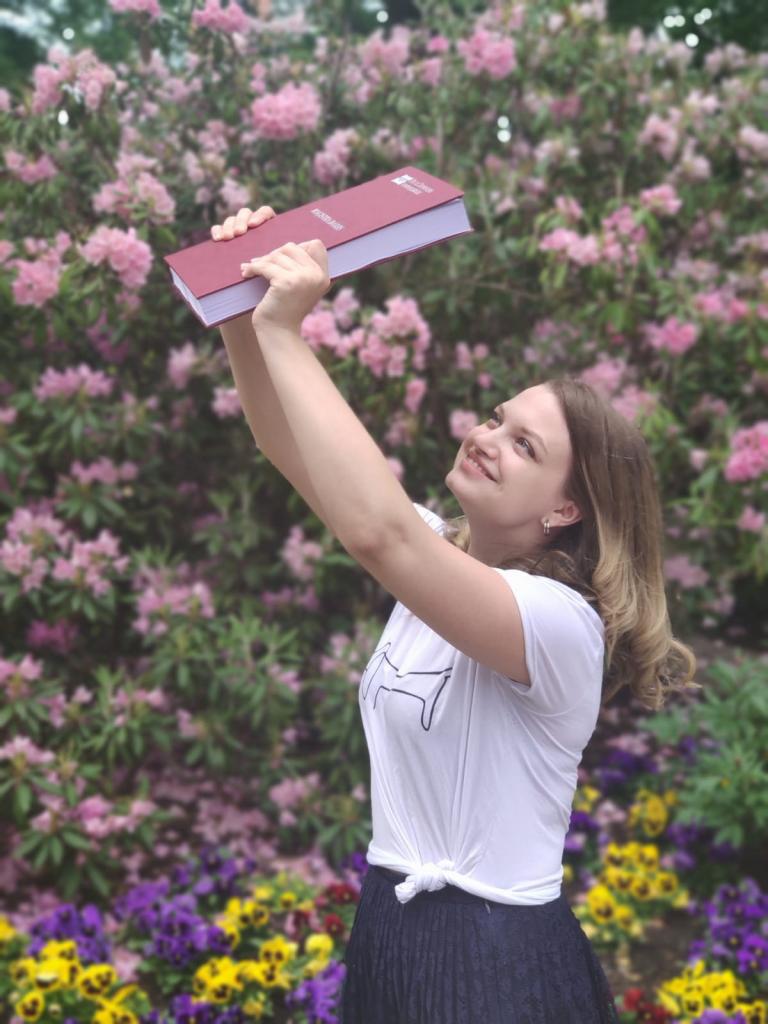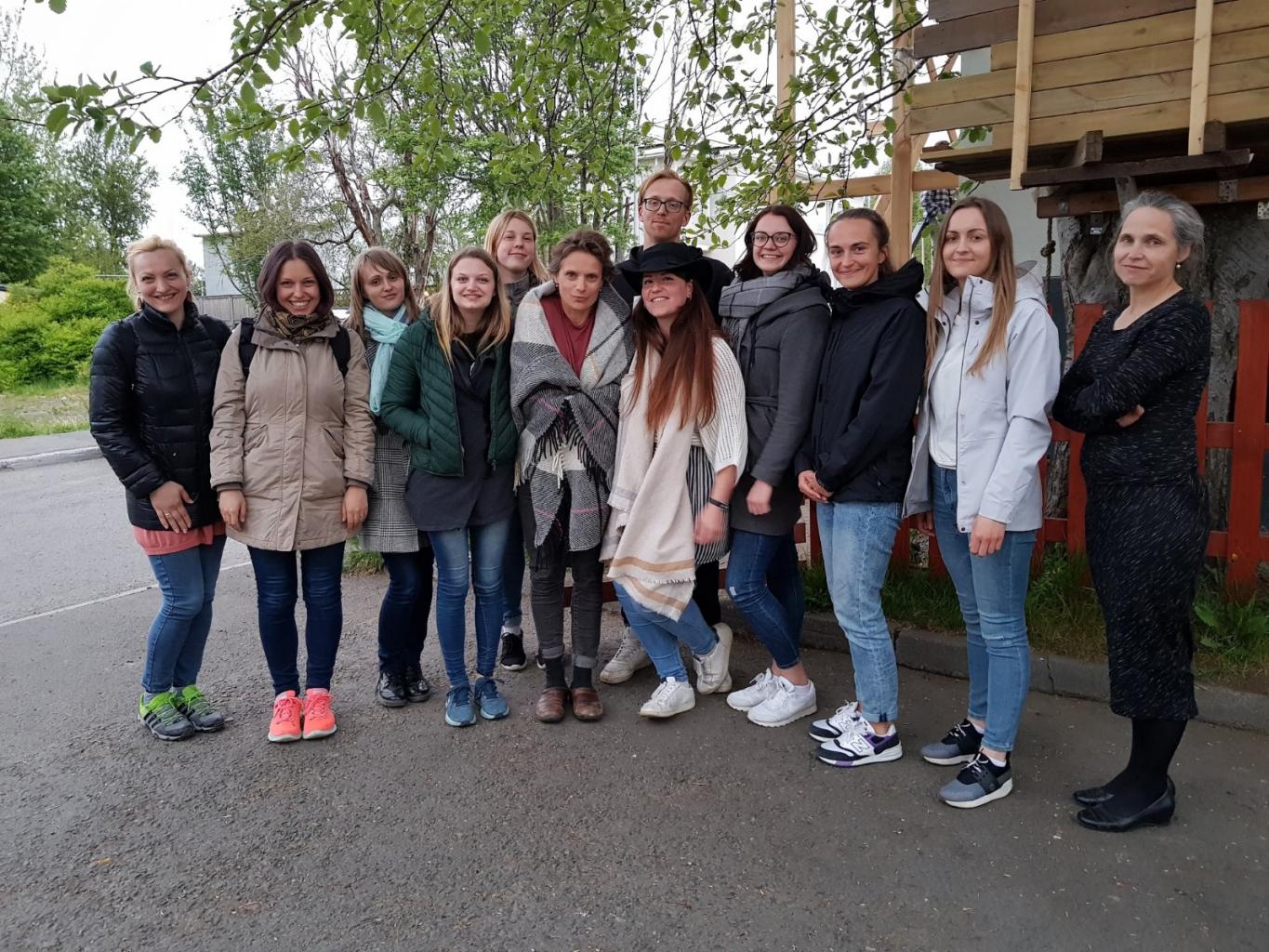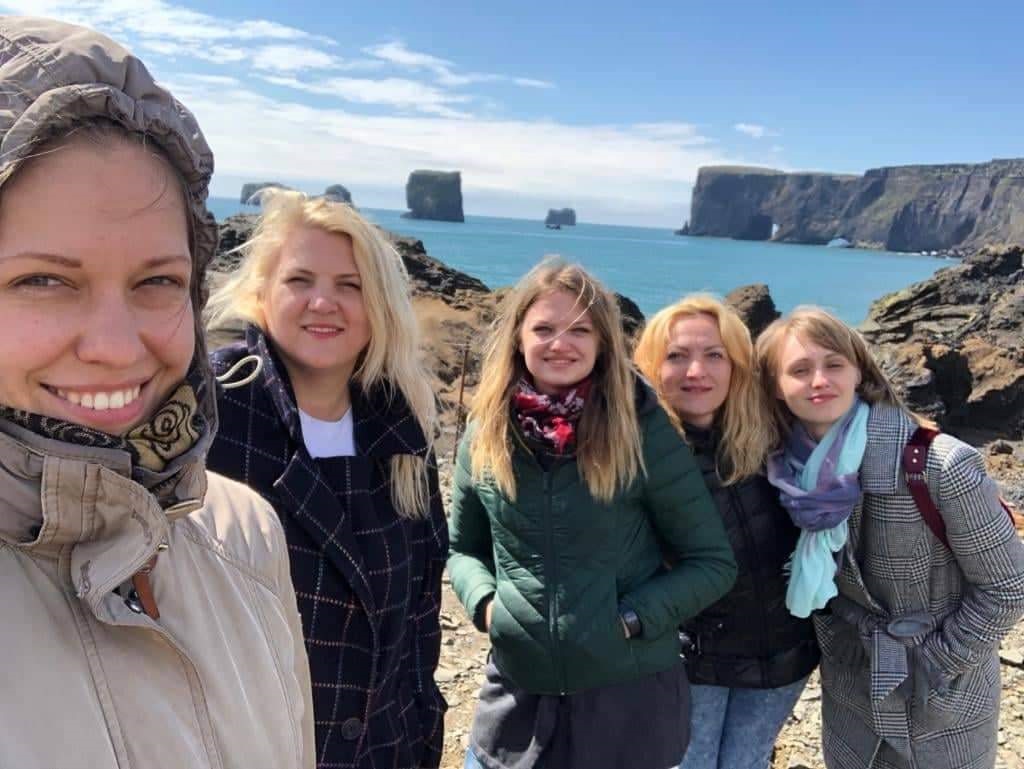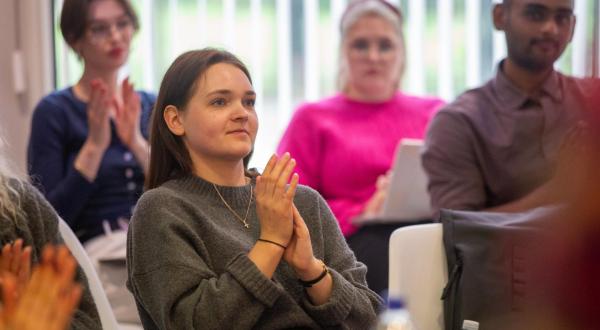Multimedia Communication Specialist Loreta Lūkina: Postgraduate Studies Expanded My Thinking
Loreta Lūkina has close ties to Rīga Stradiņš University (RSU): she has worked as a marketing specialist at RSU for three years and this is where she obtained her bachelor’s degree in Multimedia Communication. Loreta recently graduated from the Communication and Media Studies master’s programme. ‘Postgraduate studies helped expand the way I was thinking,’ says Loreta.
‘The lecturers encouraged us to look at problems from several angles, which allowed us to see the interconnections and choose the most appropriate solutions. The key words that come to mind in relation to my studies are “internationalism”, “teaching expertise” and “study environment”.’
Why did you choose to study at RSU?
I already knew that I was going to study at RSU when I was in the 10th grade. I had also decided on the specific study programme.
I wanted to study something creative, but not classical art or music, and something related to the media.
I had heard positive feedback about RSU, and I had a really good experience attending the RSU Open Day. I remember that the students had made tea and cookies and invited people interested in multimedia to a conversation, openly telling us about their studies and how easy or difficult it was to study here.
I was determined to get a master’s degree: I believe that a bachelor’s degree is a good start, but a proper higher education starts only at the master’s level. I wanted to develop in my field, because I feel like I have hit the jackpot with the field I have chosen to study – multimedia communication.
I hope, however, that this will not be the only master’s degree I get.

Loreta with her master's thesis.
What were your postgraduate studies like – the lecturers, fellow students and the environment?
I was familiar with the study environment at RSU from my undergraduate studies – the premises are modern and comfortable and the classes on Fridays and Saturdays were easy to combine with my job. It was easy to decide in favour of RSU.
We also had a large number of visiting lecturers with broad experience and an international perspective. I was surprised by the large proportion of international lecturers in our study programme, and now I understand why RSU is considered to be the most international university in Latvia. It's not only because of the large number of international students but also due to the large number of visiting lecturers. The teaching staff were very encouraging and understanding, but at the same time demanding. We could always count on their professional support and advice.
My fellow students were very varied in terms of age and occupation. They worked in everything from public administration and creative agencies to the fashion industry and the private business sector. This was very valuable because we discussed a lot and shared our experience – it added to what we learned in our classes.
One of the most characteristic features of RSU is the amount of independent work. Lectures provide the basics, but then you have to study theory yourself, and read the available research. The skill to read a huge amount of information and extract the most essential parts in a short amount of time has been very useful to me in other fields too.
We focused more on media studies in this programme, but we also had study courses such as cultural and media theory, and public and international relations. We also had more practical courses such as cinematic language where we learned to tell a visual story. Representatives working with various media formats came to our media management lectures and spoke about their experience. As part of this study course, we had to create our own project and understand how to go from idea to result.
The study pace was comprehensible and the study load was well planned – all that was left for us to do was to work on our personal time management and not miss any deadlines. There were also more hectic moments, but I would define these as contributing to my “Stradiņš resilience”. If it gets difficult it means that you’re growing. I also agree with Mārtiņš Daugulis, a lecturer at RSU, who always says: “Push your limits!” – the more you do, the more you realise you can do even more.
You were working parallel to your studies. Did the knowledge and skills that you got from your studies help you become a better specialist?
I already gained basic skills and an insight into the field of communication during my undergraduate studies. This graduate programme provided me with the ability to analyse, think critically and look at things from different points of view. We also acquired more specific knowledge such as communicating social media crises. This is what I call my most valuable study course, because it is also related to my field of work – I am responsible for social media communication at the University. We examined a lot of real examples in this study course and dealt with practical cases.
There are so many directions in communications. Where do your professional interests in this field lie?
I feel that social media and video content creation are my fields. These are also my basic responsibilities on the marketing team at RSU. These are currently also very relevant communications directions that are developing very rapidly and their importance is increasing.
I also enjoyed cultural theory: I enjoyed discussing various issues related to the media, interdisciplinary and marginal topics. I think I could expand on these interests in the future.
Studies at RSU are closely linked to research; students participate in a variety of studies and projects. How was it in your field?
Yes, students are offered the opportunity to participate in research, and my fellow students and I were not an exception.
We participated in a project on intercultural dialogue managed by Markus Hermann Meckl, a Professor from the University of Akureyri, who was one of our visiting lecturers from Iceland. The project was implemented in cooperation with the RSU Faculty of Communication, and we had to interview Latvians living in Iceland, with a particular focus on education. We lived in Iceland for one week in a pleasant, creative and active atmosphere where we were not students but fellow researchers.

Loreta (fourth from the left) together with her fellow students, and Associate Professor Ilva Skulte, the Head of the Study Programme (on the right) and Latvians living in Iceland.

Loreta (in the middle) together with her fellow students in Iceland.
RSU graduate students can also participate in the ERASMUS exchange programme and study at universities abroad. I didn’t take this opportunity, however, because we had such a large number of visiting lecturers from Germany, Finland, Norway, Iceland, Lithuania and Estonia that I sometimes felt like I was already at a foreign university.
Tell us about your master’s thesis.
I researched and compared the social media communication of sub-brands of Latvian higher education institutions, particularly analysing whether they have a uniform style as their larger institution. Since I work in the field of social media myself, I understand the importance of uniform communication and how difficult it is for universities to achieve it, because they are often decentralised. One of the conclusions of my thesis was that social media plays a major role in creating a university’s image among potential students, because about 37% of young people make the decision on where to study based on information available on social media. I also believe that university brands should develop closer cooperation with their sub-brands as this would promote the unity of university communication.
I have to say a great thank you to Ruta Siliņa, who was my supervisor, for her professional and emotional support – she did her best so that I could write a good, meaningful piece of research and could present it successfully at the defence.
Who would you say this master’s programme is for?
I would like to emphasise that it isn’t mandatory to have completed basic communications studies in order to study in this programme. Of course, the main target audience is a variety of communication specialists, including journalists and other media professionals, but my fellow students were from a lot of different specialties – translators, project managers and others.
Nowadays, communication skills are useful for everyone and I would recommend this programme to anyone who wants to improve their communication skills, to broaden their outlook, train their strategic and critical thinking and their ability to analyse.
Related news
 18 Student teams to start developing their ideas in B-Space incubation programmeFor RSU Employees, For Students, Innovation, B-Space
18 Student teams to start developing their ideas in B-Space incubation programmeFor RSU Employees, For Students, Innovation, B-Space


